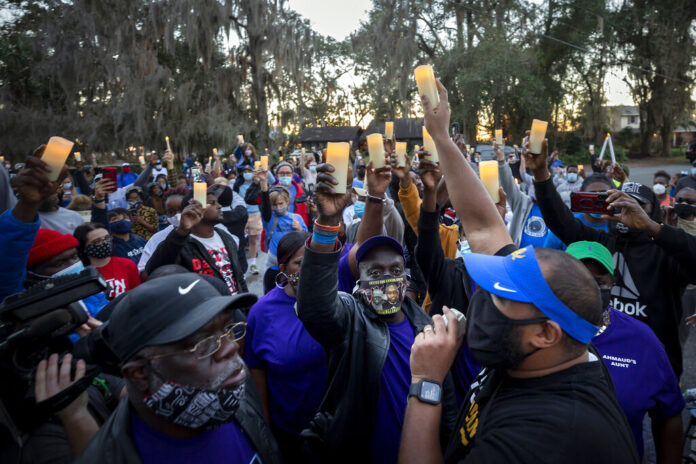
By Russ Bynum, Associated Press
No. 218 joined a bike ride supporting Ahmaud Arbery’s family after the young Black man was chased down and shot dead. No. 236 was a longtime co-worker of one of the white men charged in the killing.
Identified in court only by numbers, both people were summoned to jury duty in the trial over Arbery’s slaying. And after attorneys questioned them extensively about the case, the judge deemed both to be fair-minded enough to remain in the pool from which a final jury will be picked.
An outcry over the February 2020 slaying of 25-year-old Arbery echoed across the U.S. after graphic cellphone video of the shooting leaked online two months later. With jury selection underway in the Georgia community of 85,000 where the killing took place, it seems increasingly likely that some of the jurors who are ultimately chosen will have preconceived opinions and personal ties to the case.
The judge, prosecutors and defense attorneys have questioned 71 pool members since jury selection began Monday. After dismissing those with personal hardships or unshakable biases, 23 were deemed qualified to advance. Dozens more will be needed before a final jury of 12 plus four alternates can be seated.
While questioning potential jurors, prosecutor Linda Dunikoski often told them the ideal juror would be a “blank slate.” In the trial over Arbery’s killing, she noted, that is probably impossible.
“We can’t get that because it’s been all over the place,” Dunikoski remarked in court Thursday, October 21.
The result has been a number of potential jurors kept in the pool despite coming to the courthouse already knowing a lot about what happened and the people involved. That’s because they said they can decide the case fairly, based only on the trial evidence.
Georgia law allows someone to serve on a jury even if they come to court with an opinion about the case, as long as that person expresses a willingness to keep an open mind, said Donnie Dixon, a Savannah defense attorney and former federal prosecutor.
“The operative question is: Is your opinion so fixed that you couldn’t get a fair trial?” said Dixon, who’s not involved in the case. “The reality is, who knows? But if they say those magic words, the judge may not disqualify them.”
Greg and Travis McMichael, a father and grown son, armed themselves and pursued Arbery in a pickup truck after spotting him running in their neighborhood. A neighbor, William “Roddie” Bryan, joined the chase and took cellphone video of Travis McMichael shooting Arbery three times at close range with a shotgun.
Greg McMichael, who had recently retired after a long career as an investigator for the area district attorney, told police Arbery had previously been recorded by security cameras inside a neighboring house under construction and they suspected he had been stealing. He said Travis McMichael shot Arbery in self-defense after Arbery attacked him.
Until now, the case has been driven by outsiders. The McMichaels and Bryan were not charged until the Georgia Bureau of Investigation took over the case from local police. Greg McMichael’s ties to the district attorney resulted in the appointment of outside prosecutors from metro Atlanta. Likewise, Superior Court Judge Timothy Walmsley from Savannah was assigned to preside.
If a jury gets seated in Glynn County, where 1,000 jury duty notices were mailed, the case will ultimately be decided by people for whom the slaying hit much closer to home.
Jury pool member No. 218, a retail worker who identified herself in court as a Black woman, wrote on her juror questionnaire that “a young man was shot due to his color and the three men that committed the act almost got away.”
She said in court Thursday, October 21, that she had taken part in a bike ride to raise money for Arbery’s family after the shooting. And while telling attorneys she could be a fair juror, she also said that based on what she knows now: “I feel like they are guilty.”
Not everyone called to jury duty has been preoccupied by Arbery’s killing. A self-employed woman said she refused to listen when her husband tried to discuss the case and said she goes “out of my way not to read news or politics.”
She remains in the jury pool.
Others have been disqualified for seeming too engaged. The judge dismissed a woman who said she believes she saw Arbery running near her home not long before he was killed. She described feeling emotionally connected to him, and followed pretrial court proceedings closely.
No. 236 was kept in the jury pool even though she’s known Greg McMichael for 30 years. She still works a clerical job for the Brunswick Judicial Circuit district attorney. Though she and Greg McMichael were not close friends, she said the two had “always just been around each other.”
The woman said she also got a close look at Greg McMichael’s personnel file because she was tasked with redacting private information from it after news organizations requested copies.
She told the judge and attorneys she did not have a strong opinion about the case. What little opinion she offered was not sympathetic.
“I don’t understand why they took it into their own hands,” No. 236 said. “That’s the only thing that disturbs me about that day. I would have called 911 and let the police handle it.”
If enough people summoned to the court house keep expressing strong opinions, defense attorneys could ask the judge to halt jury selection and move the case to a different Georgia county.
“It’s the easiest time to get a change of venue,” said Don Samuel, an Atlanta defense attorney who is not involved in the case. “If half the people who are randomly picked are so biased they can’t even sit as jurors, you’re talking about a community that’s saturated by pretrial publicity.”


